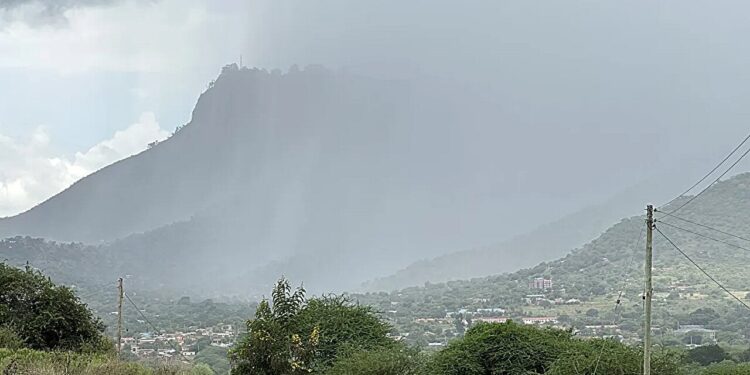In the forested peaks of the Taita Hills, 20% more water falls on the ground each year than in open areas. This is due to fog settling on the trees and dripping onto the ground as droplets. Credit: Petri Pellikka
International researchers from Finland, Germany, South Africa and Ethiopia report that deforestation over the past two decades has caused greater warming and cloud cover than those caused by climate change, threatening biodiversity and water supplies in African mountain forests.
Montane forests are often cloudy, humid, cold and found on isolated mountains in Africa. They are rich in biodiversity and act as water towers by capturing water from fog and clouds, providing high quality fresh water to millions of people in the plains of Africa.
Over the past two decades, as much as 18% of Africa’s mountain forests have been lost due to deforestation, leading to warming and rising cloud levels twice as high as those caused by climate change. Research shows that air temperatures have increased by 1.4°C, while cloud levels have risen by 230 metres over the past 20 years.
“This has major consequences for water resources and biodiversity,” says Professor Dirk Zeuss of the University of Marburg.
The study is published in Nature Communications.
Rising cloud levels reduce water recovery
Rising cloud levels reduce water collection because when the cloud hits the forest canopy, the fog (water) settles on plant and land surfaces. If the cloud base is higher, this phenomenon does not occur, says Professor Petri Pellikka, director of the Taita research station.
The phenomenon also requires that mountain tops be forested, as this increases the land cover area, and in the forest, water is better stored in trees and soil than on open land.
The study sites were in the highlands of Kenya, Tanzania, Ethiopia and South Africa. The study is one of the outputs of the Taita Research Station, which the University of Helsinki has maintained in southern Kenya since 2009. The University of Helsinki’s contribution to the study came from the Earth Change Observation Laboratory of the Department of Geosciences and Geography.
“In our studies in the Taita Hills, we measured that every year, in the forested peaks, 20% more water lands on the ground than in the open areas. This is due to fog deposited on the trees, which drips onto the ground in the form of droplets. This is in addition to precipitation. If the clouds stay higher and do not touch the forests, this phenomenon no longer occurs,” says Pellikka.
The Taita Mountains are dotted with many small forested peaks. The most important water reservoirs in Kenya are Mount Kenya, the Mau Forest, the Aberdare Mountains, Mount Elgon, the Cherangani Mountains and Mount Kilimanjaro. Although Mount Kilimanjaro is located in Tanzania, it also supplies water to the Kenyan side.
“Around Africa’s highest peak, Mount Kilimanjaro in Tanzania, 50 percent of the forest has disappeared since 1880,” says Dr. Andreas Hemp from the University of Bayreuth. He has been researching Kilimanjaro for 30 years.
Negative relationship between temperature and altitude
The study also found that due to the negative relationship between temperature and altitude, the warming effects of deforestation may decrease with altitude. However, large-scale deforestation (i.e. loss of forest cover greater than 70% over a 1 km x 1 km area) can offset the cooling effect of altitude and comparable warming may be induced at higher altitudes in African mountain forests.
“The results call for urgent action because mountain deforestation driven by cropland expansion and logging poses a serious threat to biodiversity and ecosystem services, such as water supply in Africa,” says Temesgen Abera, visiting researcher at the University of Helsinki and postdoctoral researcher at Philipps University Marburg (Germany).
The study used a data-driven approach, based on satellite observations, reanalysis data, as well as ensemble learning, empirical methods, and independent measurements of in situ temperature and cloud base height for validation.
The research group included scientists from the University of Helsinki, the University of Marburg and the University of Bayreuth in Germany, the Finnish Meteorological Institute, Addis Ababa University in Ethiopia and North-West University in South Africa. The research was part of the ESSA project (Earth Observation and Environmental Sensing for Sustainable and Smart Transformation of Agropastoral Ecosystems in East Africa).
More information:
Temesgen Alemayehu Abera et al, Deforestation amplifies climate change effects on warming and cloud level rise in African mountain forests, Nature Communications (2024). DOI: 10.1038/s41467-024-51324-7
Provided by the University of Helsinki
Quote: Rising cloud levels from deforestation threaten water supplies in African mountains, study finds (2024, August 19) retrieved August 19, 2024 from
This document is subject to copyright. Apart from any fair dealing for the purpose of private study or research, no part may be reproduced without written permission. The content is provided for informational purposes only.



